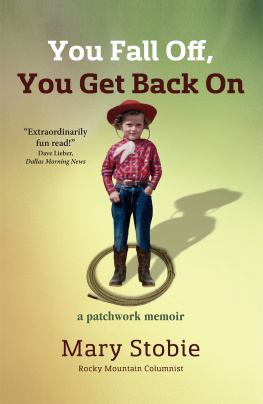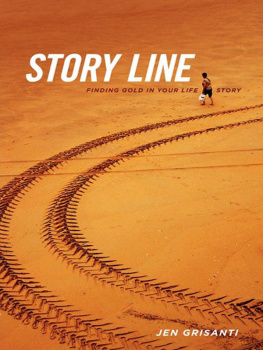Fall Line
Fall Line
noun
1. SKIING
the route leading straight down anyparticular part of a slope.
"study the fall line and plan your turns"
2018 Michael Gehron
ISBN: 9780463538142
Contents
1.False Start
One day in Togo, West Africa, I returnedhome to find a group of village women gathered around my house. Thehouse was roofless. Its corrugated lid lay thirty feet away.Inside, I found everything heaped in a pile at the center of theroom. Even the most fragile things, like the glass chimney of myhurricane lamp, remained intact.
My friend and colleague, Sebou, arrived assoon as he heard that I was home. He acted as my interpreter. Thevillage women spoke over one another, competing to talk about amighty wind. They said theyd watched it spin down from a nearbyhill. They saw it swirl in through an open window. Then the roofpopped off like a champagne cork.
Having exhausted all comment, the groupdispersed. I stood puzzling over the improbable pile of itemsstacked in the middle of the room. I wondered if the village hadgotten together and taken the roof off themselves.
Sebou laughed when I told him what I wasthinking. He said it was crazy, first because why would the villagedo that? And second, he said, if they'd done it, did I really thinktheyd be able to keep the secret for as long as they already had?I agreed that, knowing them, it seemed unlikely.
He then told me two more things. First,there would be no end of speculation about why this had happened.The whole village would want to figure out what I had done todeserve my house blowing down. They would want to identify theperson whose spirit-guide had exacted this revenge. Second, Icouldnt sit back and shrug this off because there were things Ihad to do. He said he wasnt sure what those specific things wereyet, but hed speak with the village elders and figure it out. Theywould know exactly what to do.
But I am getting ahead of myself. Let meroll the tape back first.
My Peace Corps boss dropped me, along withmy new mattress, in Kpagouda during the summer of 78. After a fewminutes, an old man walked up and introduced himself. "MonsieurRobert," he said in French, stiffening his posture in a Legionnairesalute. The village chief had asked him to wait for an anasar white man and to show him to a house. On the way there he askedwhere I was from. When I said I'm an American, he lookedstartled. So youve been to the moon? he asked.
A short distance later, he pointed to ahouse. Before I could walk through the door, someone shouted,You're not wanted here. Go away. The open hostility surprised me,as did the fact the words were in English.
The speaker turned out to be another PeaceCorps volunteer, Evan, who had arrived the previous day. Hed beenpromised he would be the only volunteer in town. He said he had nointention of sharing a house. I told him Id find alternativelodging as soon as I could.
The next morning, I set off to have a lookaround. Within a few minutes Id reached the point at which theshort line of straw-roofed huts ended. Beyond that was only thevast African plain. The very last of the dwellings caught my eyebecause it alone had a tin roof where all the rest were straw. Italso had flat walls with squared corners where all the rest wereround.
Despite the lovely vista across the street,the square building was an ugly smudge in an untended yard. Thewindows stood empty and open, bracketed by weary wooden panelsdrooping from rusted hinges. The front door, like the roofing,consisted of a thin sheet of corrugated tin. A dime-sized Chineselock held the door in place. The building was so clearly abandonedthat I didnt hesitate to put my foot to the door.
That afternoon, I reported to my new job atthe local agricultural extension office. The guy I spoke to askedme where I was staying. I mentioned the issue with Evan at thefirst house. I told him Id found alternative accommodations anddescribed the place on the edge of town. I asked Sebou, my new Agextension counterpart, if he thought thered be any problem with mytaking it. When he realized which house I was talking about, hiseyes widened in surprise. You cant stay there, he said, with afirm shake of his head. That is not a good house.
But it is fine for me, I assured him.
No. Im telling you it is not a goodhouse. I pushed it further, asking if anyone would stop me if Ihauled my stuff down there and just moved in. He ignored thequestion and stuck to his reply. Despite his counsel, I moved inthe same day. It took me several months to appreciate his point ofview.
The problems arose so gradually I hardlynotice them. It didnt seem all that strange that there would bescorpions inhabiting an abandoned house. It freaked me out the timeone fell on me from out of nowhere like some biblical pestilence.But then I realized it wasn't delivered from on high. It had justfallen from where it been crawling along an exposed roof beam. AndId managed to crush it before it had a chance to sting.
My ten year old neighbor, Kodjo, was myself-appointed houseboy. He maintained a scorpion kill list' inhash marks he chalked across one wall. He embellished it with acartoon of himself holding a flip-flop above an enormous scorpion.I got a kick out of watching the tally grow. It didnt even strikeme as odd when, thirty days in, the tally exceeded the number ofnights Id stayed in the house.
Besides Kodjo, another young man namedMobi-ja was around a lot. In fact, hed actually moved in. He wasfrom a village about thirty miles away but hed earned a covetedhigh school slot. Ours was the closest school around. I agreed togive him room and board in exchange for his doing all my chores. Itwas a good arrangement for me at least. He did everything. Hebought my meat at the market and carried my water from thestream.
But back to house problems. I wasnt therewhen they found the snake. Kodjo killed it, though not my ten-yearold neighbor. Kodjo from the Peace Corps office. Kodjo is thelocal language word for Monday, as in Our Man Monday'. It was alsothe day on which both the local and the Peace Corps Kodjo wereborn. Peace Corps Kodjo drove up and discovered the snake on mydoorstep one afternoon before Id gotten back from work. When I gothome, I found both Kodjo and the dead snake on the stoop. Its aKiese, he said, looking as if he feared it would come back tolife. It came out of that hole beside the door. Youre lucky itdidn't get you inside. It has a neurotoxin that paralyses yourheart. It kills in minutes." He shook his head and remembered thebusiness that brought him to my house. I have some bad news, hesaid. Can we talk inside?
Sitting in my living room, Kodjo told meabout a recent accident. He said a truck had hit a married PeaceCorps couple as they were crossing a small bridge on a motorcycle.The two of them were friends of mine. Kodjo said he had heard thatthey were headed home from a local market where they stopped tohave some beers with me. Then the news got worse.
They were riding a shitty local bike thatcouldnt handle the slippery dirt and the washboard in the roads.And while their bike was bad, their marriage might have been worse.They were under the common stress all volunteers face living in ataxing foreign environment. But they had the added strain of beingnewlyweds and that also took its toll. Id seen Bruce get angrywith Tanya, and hed done it again after we met at the market. Heseemed to grow angrier and more morose in proportion to how muchbeer had flowed. And we had quite a bit that afternoon.
He thought he could beat an on-coming truckacross a one-lane bridge, Kodjo told me. He judged it wrong. Thetruck crushed his leg and knocked them both over the side into astream. They plan to amputate his leg today. But because Bruce wasbleeding so much, he got more attention than Tanya. That turns outto have been a mistake. She got a bacterial infection - gaseousgangrene -and there wasn't much they could do. I'm sorry, Mike.Tanya died yesterday. Kodjo left a short time later. I sat alonein my living room as dusk turned into dark. I couldn't even bringmyself to light my kerosene lantern.
Next page











